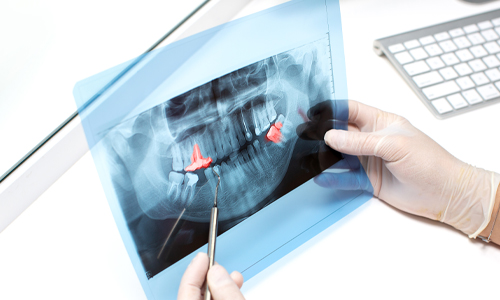Common Signs You Need Your Wisdom Teeth Removed
Are you experiencing sensitivity at the back of your mouth? Wondering whether you should get your wisdom teeth pulled out? Then read this write-up carefully and also know the common signs you need your wisdom teeth removed.
Wisdom teeth are the back molars that erupt after all other permanent teeth. This third set of molars tends to show up in people aged 17-25 years. However, they do not serve any purpose inside the mouth.
Wisdom teeth removal is not recommended by general dentists or oral surgeons if they are healthy, completely erupted, positioned properly, biting correctly with the opposite teeth, and thoroughly cleaned by following a dental hygiene regimen. But, in some people, wisdom teeth cause problems or oral health issues later if they do not grow in properly. This is when wisdom tooth extraction is required.
Regular dental check-ups can help monitor the development of wisdom teeth. However, you must be aware of the common signs you need to extract wisdom teeth before they cause any extensive damage. Keep reading to learn more about what are signs that you need your wisdom teeth out in detail..
When to Consider Your Wisdom Teeth Removal?
Wisdom teeth may grow at different angles and vary in their position. Often, a small mouth or insufficient space at the end of the teeth set can prevent the wisdom teeth from fully erupting. Wisdom teeth iimpaction can be mesial, distal, vertical, or horizontal in some people. Others may have wisdom teeth partially covered by the gums (oral mucosa).
Your dentist may advise you to have your wisdom teeth removed if they:
- Partially Emerge Through The Gums: In such a case, you would find it difficult to see and clean the wisdom teeth properly. This will cause plaque build-up resulting in oral infection and periodontal disease.
- Stay Completely Hidden Within The Gums: When your wisdom teeth get impacted within your jaw, an oral infection may occur or a cyst may be formed. This could damage the neighboring teeth or the supporting jawbone.
- Lead to Overcrowding: If there is not enough space for wisdom teeth to grow in properly, they can crowd or impact the health of adjacent teeth.
Dentists usually recommend going for wisdom teeth removal at a younger age, even before they cause any problems. It will be easier for dentists to pull your wisdom teeth before the roots and jawbone are completely formed. Your recovery will be much faster.
Common Signs That You Need to Get Wisdom Teeth Removed
- Swollen, Tender, or Bleeding Gums
When your wisdom teeth begin to erupt through your gums, the gums become inflamed and tender to touch. Some parts of your gums may appear slightly swollen and reddish. You would have difficulty maintaining oral hygiene while you brush around your wisdom teeth. Furthermore, you will notice bleeding when you brush the back of your mouth. This may happen as the wisdom teeth show up.
- Pain, Swelling, or Stiffness in Your Jaw
The structural integrity of your jaw depends on the proper eruption of all of your teeth including your wisdom teeth. If your wisdom teeth do not grow at the right angle or start pushing the adjacent teeth, the strength, integrity, and health of your jaw would be affected. You will experience changes in your bite that could be quite painful and lead to a feeling of jaw stiffness. This could make it hard for you to open and close your mouth. You will have difficulty eating.
- Pain in The Back of The Mouth
This is the most common sign that your wisdom teeth are emerging or are beginning to cause problems. The intense pain could be sporadic or persistent.
- Sinus Problems
If you have upper wisdom teeth coming in, your sinuses may get affected. You may have sinus issues because of impacted wisdom teeth that push or rub against the sinuses. The sinus problems include pain, pressure, congestion, and headaches.
- Earaches or Headaches
Wisdom teeth can cause pain and discomfort in your mouth or jaw that radiates to your head, thus causing headaches and even earaches.
- Cysts
Cysts are tiny fluid-filled sacs that are formed next to the impacted wisdom teeth. If ignored, these can harm the other teeth and your jaw by destroying the bones, nerves, tissues, and surrounding structures. In severe cases, the cyst can develop into a tumor and need additional surgery.
- Crowded or Crooked Teeth
If wisdom teeth do not come in straight, they may cause the nearby teeth to shift and even damage them. Hence, wisdom teeth extraction can help preserve the health of other teeth.
- Cavities and Bad Breath
When your wisdom teeth erupt in areas that are hard to keep clean by brushing and flossing, bacteria can fester and cause dental cavities. The food particles get stuck in and around the impacted wisdom teeth and lead to infection or inflammation. Consequently, you will have a bad taste in your mouth or bad breath all the time!
If you’re experiencing any of the signs to get wisdom teeth removed, set up an appointment with the best wisdom tooth specialist in Chicago at The Dental Specialist (TDS).

